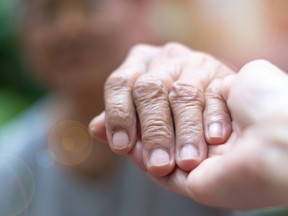These people display extraordinary courage in responding to the call to provide ongoing, unpaid care for their loved ones, They're not getting enough recognition.

As a society, we wouldn’t expect people to become a doctor, nurse or other health-care worker without adequate training and support, yet we allow family caregivers to assume this important role without preparation, or the tools they need to succeed and take care of themselves.
Caregivers are worthy of care. That message is at the heart of my research and prescription for change.
Sign up to receive daily headline news from Ottawa Citizen, a division of Postmedia Network Inc.
Thanks for signing up!
A welcome email is on its way. If you don't see it, please check your junk folder.
The next issue of Ottawa Citizen Headline News will soon be in your inbox.
I will never forget the day in 2009 when my mother was diagnosed with a serious medical condition just two days before her 52nd birthday.
I had a naïve expectation that as a recent physiotherapy graduate, I would be ideally suited to be my mother’s caregiver. I was wrong. Nothing in my professional training could have prepared me for the daily burden of caregiving nor its subsequent toll on my own physical, mental and financial wellbeing. Thankfully, my mother is now doing well, and my experience has influenced my research career to find ways to protect and enhance family caregiver wellbeing.
In Canada, about eight million people (more than 20 per cent of our population) provide unpaid care for a family member or close friend with aging-related needs, a disability or a chronic disease such as multiple sclerosis (MS). For example, people with MS can have a wide variety of symptoms that limit their ability to perform daily activities. Home care, including personal support, is vital, but costly, and access can be limited to only a few hours a week. This results in family members and friends taking on the bulk of caregiving responsibilities.
Generally, when we talk about family caregiving, we tend to focus on the negative impacts of this role. We talk about high levels of fatigue, anxiety and depression as well as social isolation and poor quality of life. These are all very real and common struggles that affect the health and wellbeing of family caregivers. However, through my research, I have uncovered an alternate reality.
I have heard countless stories from family caregivers who have experienced pride, personal growth and strengthened family relationships because of their role. We found there are four simple tools that can help support and prepare caregivers so they can achieve the positive aspects of caregiving.
• Quality physical activity. Many family members reported that finding ways to exercise helps their own wellbeing and also helps alleviate depression or anxiety symptoms.
• Community services. Support groups, counselling services and community resources provide an outlet and critical means of support.
• Support networks. A range of people can coordinate support efforts, which may include providing time off to a caregiver. This comprehensive team can come from a wider circle of family and friends as well as family doctors and personal support workers.
• Knowledge. Tools and information can be provided for caregivers to educate them about the disease or condition facing their loved one so they know what to expect and how best to provide care. This can also help with the uncertainty and fear associated with caregiving.
These are simple solutions but are often not prioritized or provided to caregivers, at least not in a coordinated way. As health-care researchers and clinicians, we must recognize that the wellbeing of caregivers and their care recipients is highly interdependent. Our health and social care systems must develop capacity to assess and monitor caregiver wellbeing so that we can intervene before crisis situations arise.
Family caregivers display extraordinary courage in responding to the call to provide ongoing, unpaid care for their loved ones and they don’t receive enough recognition. Without caregivers, many people will experience declining health and quality of life and may need to move to a nursing home or hospital sooner as their disease progresses. This puts a further burden on our overall health-care system.
We can either choose to ignore the needs of these unsung heroes or we can commit to take action to ensure that positive experiences are a reality for all caregivers. I urge us to choose the latter. I know that I may need to provide care for my mother again as she gets older, and my dream is that when that time comes, our society, our health and social care systems can better support family caregivers for the health of everyone.
Dr. Afolasade Fakolade is an Assistant Professor in the School of Rehabilitation Therapy at Queen’s University. Watch her research talk here.


